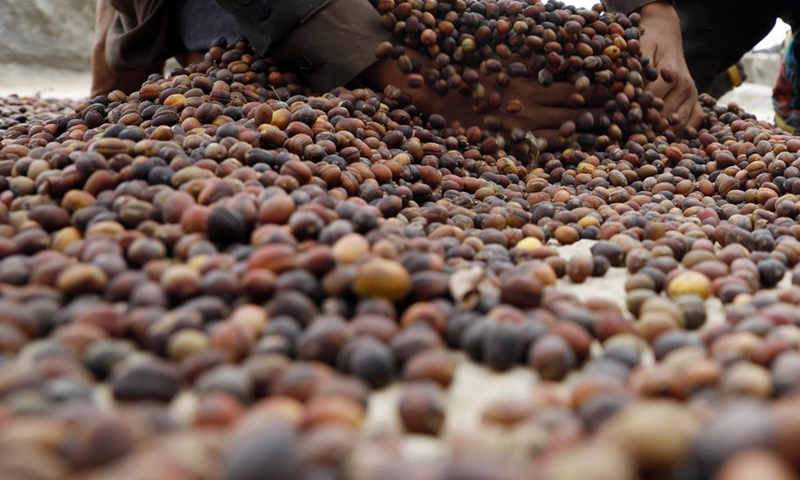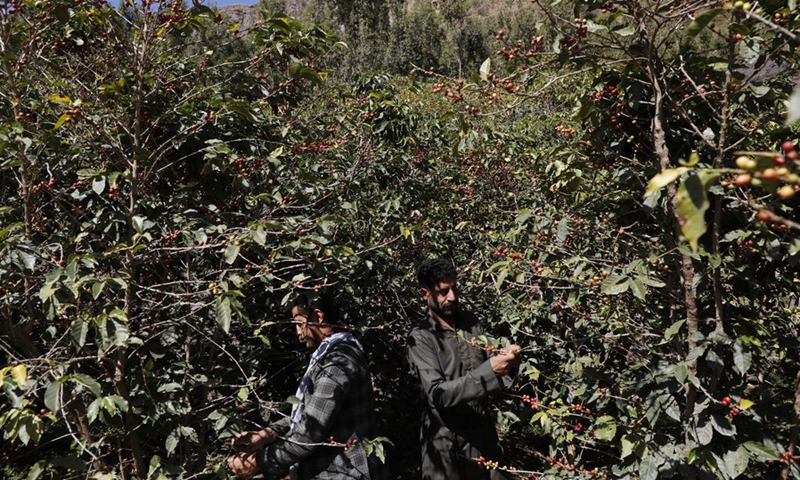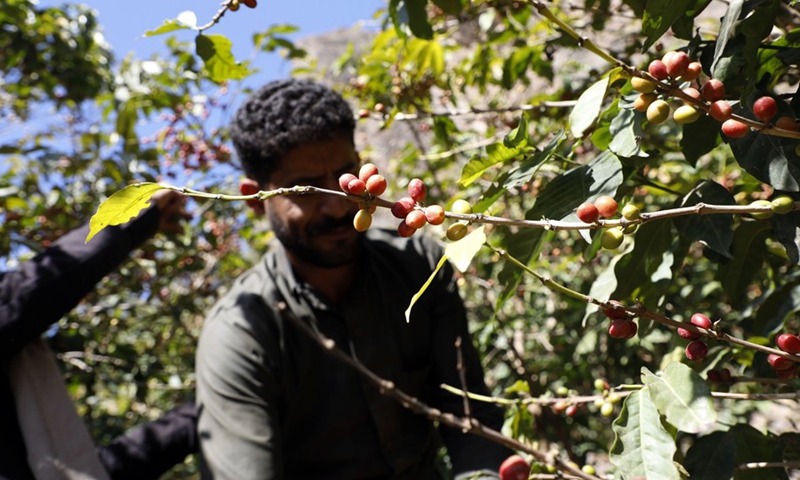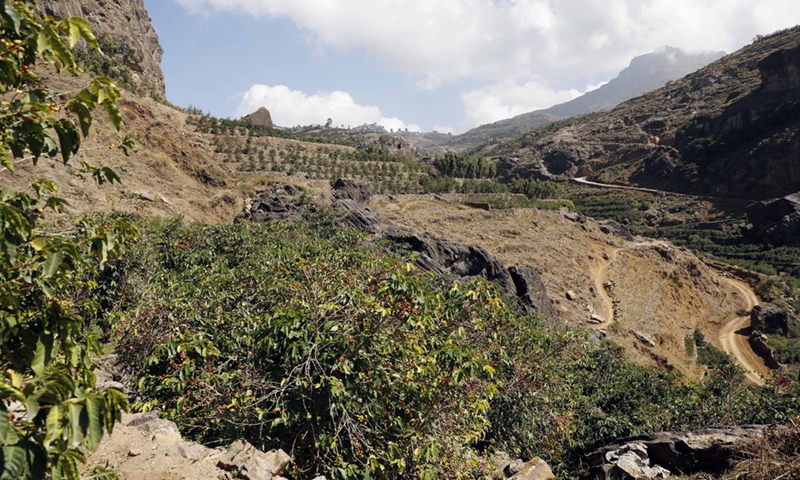
A Yemeni farmer dries coffee beans under the sun at the Bani al-Nahmy village of the Manakhah district, about 100 km west of the Yemeni capital Sanaa, on Feb. 8, 2023.(Photo: Xinhua)

Yemeni farmers pick coffee beans at the Bani al-Nahmy village of the Manakhah district, about 100 km west of the Yemeni capital Sanaa, on Feb. 8, 2023.(Photo: Xinhua)

Yemeni farmers pick coffee beans at the Bani al-Nahmy village of the Manakhah district, about 100 km west of the Yemeni capital Sanaa, on Feb. 8, 2023.(Photo: Xinhua)

A photo shows a part of coffee cultivating fields at the Bani al-Nahmy in the Manakhah district, about 100 km west of the Yemeni capital Sanaa, on Feb. 8, 2023.(Photo: Xinhua)
Hope returns to a small mountain village hiding in northern Sanaa highlands in Yemen when the coffee beans turn red again, signifying the beginning of the coffee harvest season.
"For a farmer, there is nothing better than the harvesting season," said Ahmed al-Nahmi, a coffee grower in Bani al-Nahmi village, more than 100 km west of Sanaa, Yemen's capital, as he was busy hand-picking the ripe beans along with his family.
Coffee trees have been growing in the mountains of Yemen's Sanaa Province for around six centuries. Attending coffee trees and harvesting the beans when the time comes is a centuries-old family trade for local villagers.
"I hope to get more money because this is a good season. We have more and better beans than most years," al-Nhami said.
However, he also refrains from pinning too much hope because good harvests didn't necessarily mean good income in the previous years. While Yemen's coffee industry relies heavily on the international market, the war and blockade have made the export of beans and the inflow of foreign currency extremely difficult.
"We can only sell the beans to local merchants for a very low price, much lower than years ago despite the high inflation. But the Yemeni coffee is quite expensive on the international market," the coffee grower said, complaining that the hard work of the villagers has been exploited.
In major online stores that claim to sell original Yemen coffee, a 340-gram bag of coffee beans is priced at 35 U.S. dollars, which is more than 10 times the price in northern Yemen.
In the Bani al-Nahmi village, villagers are tumbling the harvested coffee beans in the sun to let them dry faster. Everyone takes part, whether they are men, women, or children. When the drying process is completed, the beans will be loaded onto donkey carts, transported out of the mountainous area, and sold to merchants.
"We work as hard as we could and still I am worried," al-Nhami said, adding he hoped he could get enough money for the family for the rest of the year.
Back in Sanaa, the war-ravaged country's largest city, cafes are the go-to places for most residents to meet or relax.
In a cafe, Abdelaziz al-Hetar, a coffee connoisseur, said he believes the coffee made in Yemen is among the finest in the world.
He said the country has a long history of coffee cultivation and consumption, and the beans here have a unique aroma due to the acrid climate and abundant sunlight here, which gives the beans more deep chocolate tones.
He also pointed out that Yemen was arguably a coffee powerhouse when thousands of tons of Yemeni coffee beans were exported from the country's Mokha port, the city that gave the name to Mocha coffee. It is also where Arabica coffee, one of the most popular coffee varieties in the world, originated.
"However, that has changed as the country has been thrown into countless conflicts for decades," al-Hetar said.
After just restoring a long-waited peace and unification in the 1990s, Yemen was hurled into another civil war in late 2014 when the Iran-backed Houthi militia stormed several northern provinces and forced the Saudi-backed Yemeni government out of the capital Sanaa. The war has killed tens of thousands of people, displaced 4 million, and pushed the country to the brink of starvation.
Furthermore, the Arab country suffers from significant water scarcity, with much of the water used for agriculture going to irrigate qat, a tobacco-like stimulant plant that is displacing coffee and even grain crops.
"Many farmers have uprooted coffee plants and replaced them with qat plants to generate better income," said Ghalib Grman, a cafe owner in Sanaa, adding that chewing qat leaves is a harmful habit and prone to becoming addictive.
He urged the authorities to take action to encourage more farmers to grow coffee as coffee cultivation and the culture that grew out of it represent a great part of the Yemeni identity.
"Coffee plays a great role in Yemen's glorious history. I hope one day we will be able to revive it in our country," Grman said.
